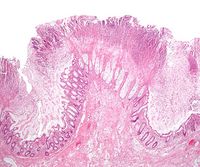Clostridium difficile
| This article has been peer reviewed but is awaiting expert review. If you would like to help with this, please see more information about expert reviewing. |
Clostridium difficle is a gram positive bacteria of the family Clostridiaceae. They are part of the normal flora, so known as a commensal bacteria. The problem arises when the bacteria competing within the host are destroyed by antibiotics.
C. difficle become overpopulated, and begin to produce pathogenic strains producing toxins, namely enterotoxin and cytotoxin. These may cause diarrhoea, and abdominal pains, or pseudomembranous colitis (PMC) under more severe circumstances.
It is a motile bacteria, showing optimal growth on blood agar.
Literature Search
Use these links to find recent scientific publications via CAB Abstracts (log in required unless accessing from a subscribing organisation).
Clostridium difficile in meat publications
C. difficile in dogs publications
C. difficile in cats publications

